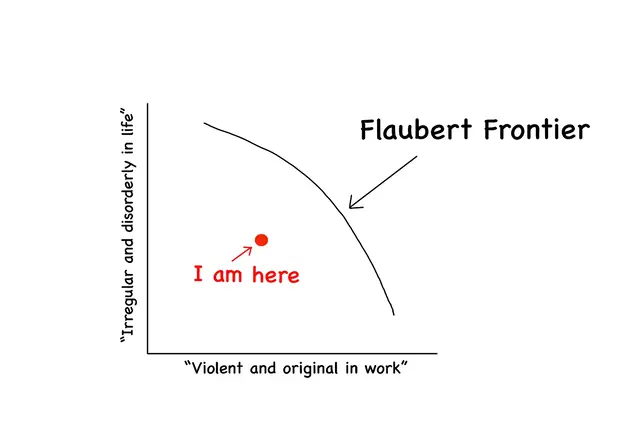Posts tagged travel
Flaubert famously said, “Be regular and orderly in your life, so that you may be violent and original in your work.” I suppose the effect of being irregular and disorderly in your life is that you end up meek and unoriginal in your work. But people much older than me seem to cheerfully handle much more demanding and incoherent travel schedules and retain their creative momentum, so clearly I’m doing something wrong. There’s a Pareto frontier here and it looks like I’m nowhere near it. Let’s call it the Flaubert frontier.
—Venkatesh Rao
video link
Instravel - A Photogenic Mass Tourism Experience
The U.S. government reported a five-fold increase in the number of electronic media searches at the border in a single year, from 4,764 in 2015 to 23,877 in 2016.1 Every one of those searches was a potential privacy violation. Our lives are minutely documented on the phones and laptops we carry, and in the cloud. Our devices carry records of private conversations, family photos, medical documents, banking information, information about what websites we visit, and much more. Moreover, people in many professions, such as lawyers and journalists, have a heightened need to keep their electronic information confidential. How can travelers keep their digital data safe? This guide (updating a previous guide from 20112) helps travelers understand their individual risks when crossing the U.S. border, provides an overview of the law around border search, and offers a brief technical overview to securing digital data.
via https://www.eff.org/wp/digital-privacy-us-border–2017
A rail company with a small-scale, experimental approach like this is possible thanks to German rail reforms in the 1990s that separated rail transit companies, who run train services, from railway infrastructure companies, who own rails. This has opened up Germany’s market to some competition between smaller companies such as Transdev and Deutsche Bahn, though the latter still dominates. The relationship between Locomore and DB is close but somewhat uneasy. Deutsche Bahn will not sell Locomore tickets from station ticket booths, making them available only online. What’s more, the project was apparently too unusual-sounding for most conventional investors, so Locomore has relied on crowdfunding to get its start-up capital. So far over €640,000 has been raised, and the amount is still rising. This alone sounds like a rather low investment threshold to start a new train line, but a Locomore representative wasn’t available to comment on what this sum covers and whether other funding sources are being used. (We’ll update when we learn more.) Germany is nonetheless going through an interesting period of small-scale rail innovation that’s worth paying attention to. Locomore’s current service is just the first of three more planned for 2018, to Cologne, Munich, and the Baltic vacation island of Rügen. Meanwhile the world’s first ever hydrogen-powered passenger train is coming this month. It also won’t replace Germany’s currently dominant model, but provides a small-scale and invaluable alternative.
via http://www.citylab.com/commute/2016/12/locomore-germany-crowdfunded-train/510752/
Faith is a concept that often enters the accounts of GPS-induced mishaps. “It kept saying it would navigate us a road,” said a Japanese tourist in Australia who, while attempting to reach North Stradbroke Island, drove into the Pacific Ocean. A man in West Yorkshire, England, who took his BMW off-road and nearly over a cliff, told authorities that his GPS “kept insisting the path was a road.” In perhaps the most infamous incident, a woman in Belgium asked GPS to take her to a destination less than two hours away. Two days later, she turned up in Croatia.
http://www.nytimes.com/2016/02/14/opinion/sunday/ignore-the-gps-that-ocean-is-not-a-road.html?action=click&pgtype=Homepage&clickSource=story-heading&module=span-abc-region®ion=span-abc-region&WT.nav=span-abc-region
A Thai airline will allow passengers to purchase seats for life-like dolls that their owners treat as real children due to their belief that they possess supernatural powers.
http://www.bloomberg.com/news/articles/2016–01–25/supernatural-dolls-welcome-aboard-thai-planes-with-child-ticket
